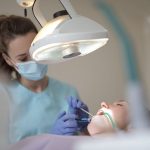Gum disease is the most common cause of tooth loss across the world. It is thought that gum disease is responsible for approximately 70% of missing teeth.
Although gum disease has decreased in the last few decades, it is still prevalent here in Australia, so you must visit your dentist regularly to make sure that your gums are strong and healthy and free of disease.
Gum disease is asymptomatic; therefore, if you do not visit your dentist regularly, then it can develop without you noticing.
When you experience symptoms, you must visit your dentist without delay. The symptoms of gum disease are unpleasant and uncomfortable. You will notice bleeding gums, bad breath even after you brush your teeth, swelling and redness, and your teeth may become wobbly.
These issues must be addressed sooner rather than later; otherwise, they can result in tooth loss.

Tooth loss
Tooth loss can have a significant impact on all aspects of life. It is important that missing teeth are addressed as soon as possible; otherwise, it can have complicated effects on your remaining teeth.
If you undergo a tooth extraction, it is also important that you have the tooth replaced as soon as possible to avoid complications.
Dental implants
Dental implants in Ryde are one of the most popular methods of replacing missing teeth. Dental implants are small titanium screws that can replace the roots of missing teeth.
This allows you to have a prosthetic of your choice securely fixed into your mouth to restore the appearance and function of your teeth.
It is an excellent alternative to temporary or removable prosthetics, providing stability and security so that you can eat, speak, laugh and smile as you did before you lost your tooth.
To find out whether dental implants are suitable for you, you will need to undergo an oral examination to determine the health of your teeth, gums and jawbone.
If you are still suffering from gum disease, this will need to be addressed prior to replacing your teeth with dental implants; otherwise, it could further damage your gums or cause your dental implants to fail.
Related Posts
Dental implant surgery
You will need to undergo diagnostic imaging, including an x-ray, a CT scan and an intraoral scan as necessary to create an accurate image of your mouth.
Diagnostic imaging can allow your dentist to plan your dental implant surgery; this includes deciding how many implants you need, where they will need to be placed and the size of the implant suitable for you.
This varies from patient to patient and depends on the number of teeth you are missing and other factors such as bone density, gum health, the size of your mouth and the force of your bite.
Speak to your dentist today and learn more about dental implants and whether or not you are eligible for dental implant surgery.
Dental implants can have a significant positive impact on your dental health and improve the quality of your life.
Speak to your dentist today and book an appointment so that you can begin your journey on replacing your missing teeth.
DISCLAIMER
Any surgical or invasive procedure carries risks. Before proceeding, you should seek a second opinion from an appropriately qualified health practitioner.





